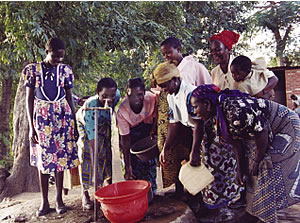A BLESSED GIFT
Living among the poor in Malawi, I have learned to appreciate the gift of water, a gift I took for granted in Canada
By Mary Olenick
September 2004
Return to Table of Contents
Print Article
While living in Canada, it never crossed my mind how much I took for granted a constant supply of clean water. I could be assured of water every time I turned on a tap. And I could always flush the toilet.

Mary Olenick
I recognized the loss of this unheralded privilege when I came to Malawi as a Scarboro lay missioner in 2000. One of the harsh realities of the area that I live in is the lack of a constant supply of water as well as clean water. It was not just a matter of adapting to this reality, I now had to plan part of each day around the task of obtaining water.
Water to the compound is piped by gravity into three tanks from a river up in the mountains about seven kilometres away. The water supply is turned on in the morning and later in the afternoon, at which time the whole community fills their pails. Sometimes the pipes break and we are without water for a few days.
Through overseas donations, we now have eavestroughs on some of the houses in our compound so people can catch rainwater, which is much cleaner than the water from the taps. I often get up in the middle of the night to put out pails when I hear the rains start.
For me, the most difficult aspect of not having a constant supply of water is not being able to flush the toilet. I remember the day I saved dishwater to recycle for the toilet. Instead of pouring it into the toilet bowl, I poured it into the tank. A short while later the tank was covered in ants, attracted by the smell of food in the water. I never made that mistake again.
Sometimes days go by without my being able to take a shower. Either the water is not on or the water pressure is not strong enough. When I was preparing to come to Malawi, I wondered how I would adjust to cold showers. Surprisingly, I soon got used to them and quite enjoy them now.
Despite these adjustments, I consider myself fortunate because most local people do not have running water in their homes like I do. They get their water from a common tap. If the water is off, they fetch water from the nearby river. Very few boil the water before drinking, as they cannot afford the extra wood for the fire.

Filling their buckets at the communal water tap. St. Patrick's compound, Rumphi, Malawi.
Coolman, a young man who works for me, often comes to my house to get water to wash with or to cook his supper. Because he is away at school all day, he cannot replenish his own supply of water when the taps are turned on. It is at times like these when the reality of having to share a very basic need with others has a very strong impact on my views.
Sometimes I try to imagine myself in the shoes of the women here: If I was the one who had to settle for any type of water because I was thirsty, even though this water sometimes made me sick. If I was the one who had to ask a neighbour for water because I had none and needed to wash. If I was the one who had no water to cook supper for my family and had to ask a neighbour to share some of their water so we could eat. In all honesty, I am not sure I could accept things quite so humbly as the women here.
When I return to Canada I will look at water in a whole new way and remember my neighbours and friends in Malawi who struggle for this blessed gift of life.
Return to Table of Contents
Print Article